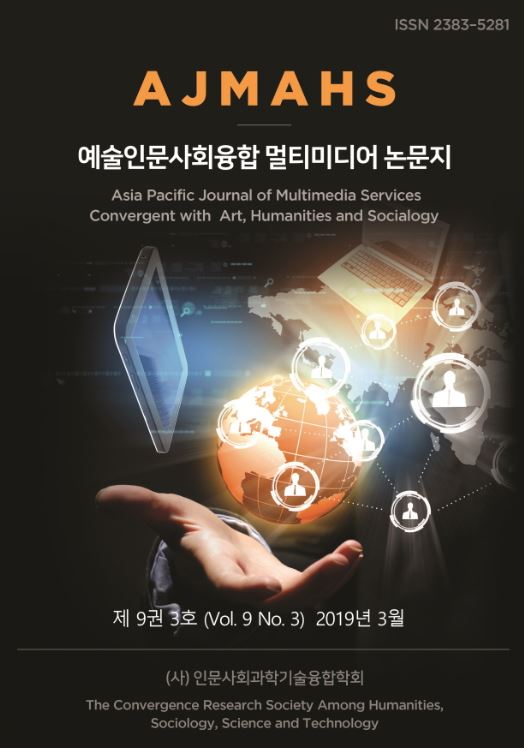SNS 언어폭력성(비속어, 은어)에 관한 연구
An Empirical Study of SNS Language Violence(Expletives, Slang)
- 인문사회과학기술융합학회
- 예술인문사회융합멀티미디어논문지
- 9권 3호
-
2019.0399 - 108 (10 pages)
- 1,225

최근 청소년들 사이에 SNS를 이용한 사이버 폭력이 급속히 증가하고 있다. 학교 폭력의 양상이 오프라인의 신체적 폭행, 집단 따돌림 등의 형태에서 사이버 언어폭력의 형태로 변화하고 있다. 스마트폰의 급속한 확산으로 청소년들은 언제 어디서나 SNS를 사용할 수 있고 비속어‧은어 등의 많은 문제점들이 나타나고 있다. 따라서 본 연구에서는 사이버 언어폭력이 정보윤리교육과 교육성과에 미치는영향에 관하여 실증적으로 분석하였다. 연구의 요약은 다음과 같다. 가설1의 검정결과는 다음과 같다. 첫째, 비속어는 정보윤리교육에 유의한 영향을 미쳤다. 둘째, 비속어는 자아정체성교육에 유의한 영향을 미쳤다. 가설2의 검정결과는 다음과 같다. 셋째, 은어는 정보윤리교육에 유의한 영향을 미쳤다. 넷째, 은어는 자아정채성교육에 유의한 영향을 미쳤다. 가설3의 요약은 다음과 같다. 다섯째, 정보윤리교육은 교육성과에 유의한 영향을 미쳤다. 여섯째, 자아정체성교육은 교육성과에 유의한 영향을 미쳤다.
Recently cyber violence using SNS among teenagers is increasing rapidly. School violence patterns are changing from offline forms of physical assault and harassment to cyber verbal abuse. With the proliferation of smartphones, young people can use SNS anytime and anywhere, and there are many problems such as Slang and jargon. Therefore, the effects of cyber verbal violence on information ethics education and educational performance were empirically analyzed. The summary of research findings is as follows. The test results of Hypotheses 1 are follows. First, slang has a significant impact on information ethics education. Second, slang has significantly affect self-identity education. The test results of Hypotheses 2 are follows. Third, jargon has significantly affect information ethics education. Fourth, jargon has significantly impact self-identity education. The test results of Hypothesis 3 is follows. Fifth, information ethics education has significantly affect on educational performance. Sixth, self-identity education has a significant effect on educational performance.
1. 서론
2. 이론적 배경
3. 연구설계
4. 결론
(0)
(0)